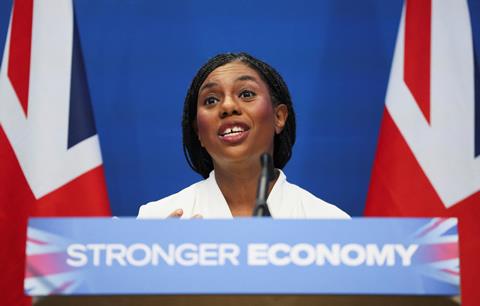Those who cannot work do need looking after, says Miriam Cates. But the Bible does not say the government should do this. When we take that responsibility away from families, communities and churches, we weaken them rather than strengthen them

In her recent speech to the Conservative Christian Fellowship, party leader Kemi Badenoch told her audience that protecting the “responsibility and dignity of work” is a Christian imperative. Defending her party’s position that the welfare expenditure must be reduced, Badenoch referenced St Paul, saying “the first Epistle to Timothy proclaims that: ‘Anyone who does not provide for his own household… is worse than an unbeliever,’” (see 1 Timothy 5:8).
The speech ruffled feathers among some Christians. But what if Badenoch is right? Rather than dismissing her because she doesn’t share our faith - or rejecting her view on welfare because it sounds ‘unchristian’ - perhaps we should consider whether the Conservative leader has an important message for the Church about the proper – and improper – role of government.
Made in God’s image
The purpose of Paul’s letter to Timothy was to offer advice on church leadership, so his admonishment of the work-shy is directed at believers. But the direction to work and to provide for ourselves and our families is not only for Christians.
The very first command that God gives to all humanity is to work. “Be fruitful and increase in number; fill the earth and subdue it” (Genesis 1:28). Fruitfulness and increase are God’s plan for us all.
As welfare spending has boomed, family and the Church have declined
Work is also the first recorded act of God himself. And since human beings are made in God’s image, it stands to reason that we are made for work. This can take many different forms, and the type of work we’re capable of can depend on our age, sex, health, opportunity and circumstances. But no one – believer or unbeliever – is designed for idleness or dependency.
Of course, that does not mean that those who cannot do paid work should not be supported. The Bible is clear that widows, orphans and the sick should be looked after. The early Church was characterised by its counter-cultural care for the poor. Yet this biblical welfare model is one that is delivered through the family, community and the Church - not the state.
Godly governance
The Bible is clear about the role of government. According to 1 Peter 2:14 “governors…are sent by him to punish those who do wrong and to commend those who do right.” Romans 13:4 tells us that the authorities “are God’s servants, agents of wrath to bring punishment on the wrongdoer.”
The government’s primary role is to uphold the law. Of course, rulers should seek to prevent the vulnerable from being exploited - this was a requirement for Old Testament kings. Yet although the idea that the poor should be provided for is a biblical one, the belief that this must be done through state-enforced redistribution is not.
Our current welfare system demonstrates exactly why state provision is such a failure. The UK spends over £300bn a year on benefits. Yet, as a society, we have never been more lonely, sick or despairing. In removing the imperative for families, communities and the Church to provide and care for the vulnerable, we have robbed these institutions of their purpose and their power. It is no coincidence that, as welfare spending has boomed, family and the Church have declined.
No one – believer or unbeliever – is designed for idleness or dependency
The Centre for Social Justice has shown that many of those claiming benefits now have more income than full-time employees. Every day in Britain, 5,000 additional people are signed on to long-term sickness benefits, which is double the pre-pandemic number. This increase is the product of a system that disincentivises work.
Among lower income households, we have record levels of family breakdown – which is unsurprising when parents on universal credit can claim more money if they live apart. Through over-taxation, the welfare state punishes those who work hard, get married and have children, and rewards those who do not. This is the opposite of the proper role of government.
Restore and rebuild
The only way to rebuild the family, community and the Church is to restore the need for them. Marriage, childbearing and strong communities were not meant to be a romantic ideal, a ‘nice to have’ once the state has done its job in providing us all with an income. Rather family and work - increase and fruitfulness - are an essential part of God’s plan for human flourishing.
By removing the link between work and provision, our bloated welfare state now discourages people from taking responsibility for their own families and neighbours. And too often the ‘care’ provided by the state is transactional, disembodied and lacking in real human compassion.
Kemi Badenoch is right to call for a reduction in welfare spending, and she has put her finger on an uncomfortable truth. Many in the Church have imbibed views about the role of the state that are deeply unbiblical.
I’ve lost count of the number of prayers I’ve heard said in church for politicians to “provide for the poor” or “end austerity”. Yet this is not the proper responsibility of the government. Rather it is the sacred duty of the Church, through sacrificial generosity and obedience to Christ, to answer the call to remember the poor.
For an alternative perspective, see this response article from Hannah Rich at Christians on the Left






































5 Readers' comments